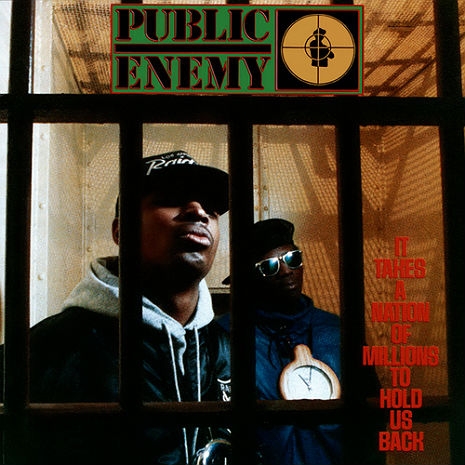
Public Enemy released It Takes a Nation of Millions to Hold Us Back in 1988. Few albums have made a bigger impression on me or meant as much.
Today, Flavor Flav is a former reality TV star and Chuck D is a former Air America Radio personality and an elder statesman more generally. It’s difficult to reconstruct just how weird and scary Public Enemy once was to White Amerikkka. In 1989, when I first heard Nation of Millions, I was a college freshman who listened exclusively to radio-ready pop music and classic rock, with the exception of the speed metal I had recently gravitated towards—in fact, the inclusion of a snippet of “Angel of Death” by Def Jam labelmates Slayer on “She Watch Channel Zero” was one of the first facets of the album that attracted me to it.
_465_166_int.jpg)
We didn’t know it then, but 1988 was the heyday of intensely sample-heavy rap LPs before the lawyers ruined everything—other masterpieces using that approximate technique include the Beastie Boys’ Paul’s Boutique and De La Soul’s 3 Feet High and Rising. For a dopey white kid from the suburbs, the texture of Nation of Millions was heady, intoxicating. I could obscurely categorize all the talk of “white devils” for which Professor Griff would soon be jettisoned from the band as “wrong,” but most of the other stances, even the incoherent ones, were far more difficult to rebut. The sound of the album was insistently “hard” and justifiably angry, funky and brainy, an album to drive you to bone up on James Brown and Malcolm X. The purpose of the approach was to change minds, but I often wonder if Chuck D and the Bomb Squad had any notion of the appeal the album might possess for impressionable white kids. I suspect it wasn’t much on their minds.
The densely multilayered nature of Nation of Millions cries out for a deconstruction—preferably one that can be imbibed via the ears. Fortunately, on the Solid Steel Radio Show a few months ago, DJ Moneyshot released a remarkably enjoyable hour-long episode that does precisely that. For anyone who loves the album, the show is a singular treat, nothing less than an aural essay on its sources, of which there are many. Civil rights speeches, immortal soul classics, contemporaneous rap gems, and interviews with the likes of Hank Shocklee are all mixed together, Bomb Squad style, into a delightful stew.
Oddly, I’d learned only days earlier that one of the key opening samples from “Black Steel in the Hour of Chaos” stems from Stevie Wonder’s Innervisions; I also had no idea that David Bowie’s “Fame” was used as the bed for one of Griff’s mottos in “Night of the Living Baseheads.” I’m going to assume that many DM readers, being less ignorant than myself, will still derive considerable enjoyment from this head-scrambling mix.
Thanks to Lawrence Daniel Caswell!